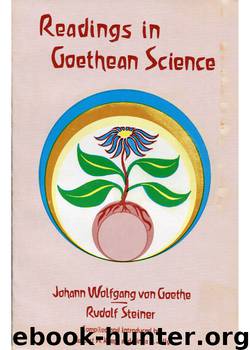Readings in Goethean Science by Johann Wolfgang

Author:Johann Wolfgang
Language: eng
Format: epub
Publisher: Bio-Dynamic Farming and Gardening Association, Inc.
The following chapters have been taken from Rudolf Steiner's A Theory of Knowledge Implicit in Goethe's World Conception.* It should be noted, however, that a thorough understanding of their content is dependent on a study of the preceding chapters. In these chapters, Steiner explains how knowledge stems from two sources: the empirical content (sense experience) and thinking. Experience is the “given”; however, in each human being thinking can acquire step-by-step higher capacities, i.e., it is capable of development. On the one hand, it is also a “given” but, on the other, thinking also holds a unique position. Man is consciously present when a thought is formed. He can be aware of all the circumstances and the objective reasons which lead to the thought. He himself thinks, but the content of his thoughts is not arbitrary. Thus, external facts as immediate experience are present as they are, but they bear nothing in themselves which would relate them to one another. Their relationship lights up in thinking, which thus creates a comprehensible unity of what is otherwise unrelated “chaos.” Hence, knowledge is not merely the mirror image in the human mind of a full reality existent in the external world. Rather, knowledge molds into a spiritual reality what otherwise exists as fragmented and unrelated precepts. One can become aware of a deeper meaning of the word reality, a reality which is not only outside, but evolved through cognition.
*Translation and Introductory Notes by George Adams Kaufmann, M.A. Cantab.
†Photomechanical reproduction (in German) by Rudolf Steiner Verlag, Dornach, Switzerland, 1975.
*Goethe's Naturwissenschaftliche Schriften, Rudolf Steiner Verlag, Dornach, Switzerland, 1972.
*Rudolf Steiner, Goethe's Conception of the World (First ed. in Germany 1897), London 1928.
*It was in fact, as Rudolf Steiner subsequently discovered in the Weimar archives, Goethe's friend G. Ch. Tobler who wrote the Essay, not as an actual dictation but as a faithful record of what he had received from Goethe. Dr. Steiner's article on the subject, wherein he shows how intimately the thoughts of the Essay are related to Goethe's life-work upon Nature, is to be found in the Schriften der Goethe-Gesellschaft, Vol. VII, Weimar, 1892.
*“Imaginative consciousness,” in Steiner's anthroposophical terminology is the first (of three) stages of higher knowledge.
*Friedrich Schiller's (1759-1805) The Robbers is one of the most famous dramas of the “Sturm und Drang” period, which as a reaction against the dry “rational” epoch, preceded the classical and romantic periods in German Literature. Franz Moor, mentioned below, is a character in this drama.
Wilhelm Heinse (1746-1803) poet; his major work is “Ardinghello und die glückseligen Inseln” (1787).
*Horen are the greek goddesses of the seasons, also called law, justice and peace. “Horen” was the most important magazine in Goethe's time. Schiller was the editor from 1795 to 1797.
*Immanual Kant (1724-1804) who lived in Königsberg is considered by many to be the foremost philosopher of the modem age. According to his “Critique of Pure Reason” ultimate realities (things in themselves) are not reached by the human mind. Rather, appearances of sense are given to us within the forms of space and time, which are conditions set by the human mind.
Download
This site does not store any files on its server. We only index and link to content provided by other sites. Please contact the content providers to delete copyright contents if any and email us, we'll remove relevant links or contents immediately.
Whiskies Galore by Ian Buxton(41984)
Introduction to Aircraft Design (Cambridge Aerospace Series) by John P. Fielding(33115)
Rewire Your Anxious Brain by Catherine M. Pittman(18640)
Craft Beer for the Homebrewer by Michael Agnew(18234)
Cat's cradle by Kurt Vonnegut(15329)
Sapiens: A Brief History of Humankind by Yuval Noah Harari(14361)
Leonardo da Vinci by Walter Isaacson(13315)
The Tidewater Tales by John Barth(12649)
Thinking, Fast and Slow by Kahneman Daniel(12251)
Underground: A Human History of the Worlds Beneath Our Feet by Will Hunt(12084)
The Radium Girls by Kate Moore(12013)
The Art of Thinking Clearly by Rolf Dobelli(10446)
Mindhunter: Inside the FBI's Elite Serial Crime Unit by John E. Douglas & Mark Olshaker(9313)
A Journey Through Charms and Defence Against the Dark Arts (Harry Potter: A Journey Throughâ¦) by Pottermore Publishing(9268)
Tools of Titans by Timothy Ferriss(8363)
Wonder by R. J. Palacio(8097)
Turbulence by E. J. Noyes(8040)
Change Your Questions, Change Your Life by Marilee Adams(7756)
Nudge - Improving Decisions about Health, Wealth, and Happiness by Thaler Sunstein(7689)
